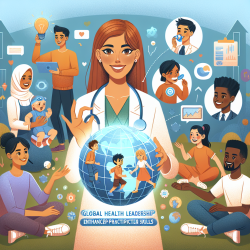Bridging Gaps in Global Health Leadership: Lessons for Practitioners
In the realm of global health, leadership programs play a pivotal role in shaping effective leaders who can navigate the complexities of health systems worldwide. The research article "Gaps, Challenges, and Opportunities for Global Health Leadership Training" provides a comprehensive analysis of two prominent Global Health Leadership (GHL) programs: the Afya Bora Consortium Fellowship and the Sustaining Technical and Analytic Resources (STAR) project. These programs offer valuable insights that can be leveraged by practitioners, including those in speech-language pathology, to enhance their leadership skills and improve outcomes for children.
Key Findings from the GHL Programs
The Afya Bora and STAR programs have significantly impacted the global health leadership landscape. Afya Bora has trained 188 multidisciplinary fellows, with all African fellows engaged in leadership roles in their respective countries. STAR has placed 147 participants across 25 countries, fostering collaborations that improve global health outcomes.
Both programs identified several areas for improvement, including operational procedures, financing, and sustainability. These insights are crucial for practitioners seeking to enhance their leadership capabilities.
Implementing Lessons Learned
Practitioners can apply the lessons from these programs in several ways:
- Develop Core Competencies: Focus on building essential skills such as effective communication, strategic direction, and commitment to health priorities. These competencies are vital for leadership roles in any health-related field.
- Foster Interdisciplinary Collaboration: Encourage collaboration across various disciplines to address complex health challenges. This approach is particularly beneficial in speech-language pathology, where multidisciplinary teams can enhance child outcomes.
- Embrace Virtual Learning: Leverage technology to facilitate learning and collaboration, especially in the context of global health challenges like pandemics. Virtual learning can provide flexible and accessible training opportunities for practitioners worldwide.
- Focus on Sustainability: Ensure that leadership programs are sustainable in terms of financing, delivery, and integration of knowledge. Practitioners should advocate for long-term funding models to support continuous professional development.
Encouraging Further Research
While the Afya Bora and STAR programs offer valuable insights, there is still much to learn about effective global health leadership. Practitioners are encouraged to engage in further research to explore areas such as:
- Identifying the most effective training methods for different health sectors.
- Exploring the role of technology in enhancing leadership training.
- Investigating the impact of leadership training on child health outcomes.
By delving deeper into these areas, practitioners can contribute to the ongoing development of effective global health leadership strategies.
To read the original research paper, please follow this link: Gaps, Challenges, and Opportunities for Global Health Leadership Training.










